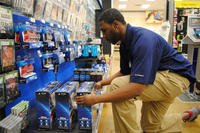When I teach journalism, I begin by asking the students three questions: 1) How many of you want a career in journalism? 2) How many of your parents have tried to talk you out of a career in journalism? 3) How many of you have a subscription to the local newspaper?
The first two questions elicit knowing nods and anxious smiles. The third question often results in dead silence. I can tell by the students' sideways glances that they expect a lecture: "You want a career in journalism, but you don't subscribe to a newspaper?" They've heard it all before—how young people today don't care about the news, how traditional media is as dead as dinosaurs. It's why their parents try to talk them out of a career in journalism.
One time, a young-adult told me she doesn't follow the news because she doesn't have a television. That should make my broadcast journalism friends happy, but my newspaper heart died a thousand morbid deaths that day.
So the students are usually surprised when I tell them I didn't have a subscription to a newspaper when I was in college either. The college experience is life in a bubble. Leaving campus is like entering a foreign country. The passport: Your roommate's car.
Eventually, however, the bubble bursts, and you end up like every other 30-something adult married with kids. This is when I walk the students through my typical day:
- Wake up, and not because my alarm went off, but because my preschooler has wet his pull-up.
- Put kids' frozen waffles in the toaster
- Eat yogurt—the same breakfast I've eaten for the past five years because it's easy and allows me more time to make frozen waffles.
- Fill backpacks and lunch boxes. Sign homework.
- Take the kids to school. Argue with them about their choice of clothes.
- Go to work. Pray the elementary school doesn't call to tell me someone has gotten sick and needs to come home.
- Go home.
- Make dinner. Feed the dog. Clean dishes. Fold laundry. Argue with the kids about how long they should brush their teeth.
- Bedtime stories.
- More laundry.
- Drag myself upstairs to bed. Fall asleep with book on my face.
- Wake up and do it all over again.
It's a grim forecast, much worse than the students' parents' outlook on the publishing industry. Increasingly, the students look nervous. So I share my one bright spot with them: the local newspaper.
My daily routine seldom changes; therefore, I live vicariously through the newspaper, where people and events are completely unpredictable. One day the headline is two lost dogs; the next day, a triple homicide.
In my monotonous real life, I also don't have breaks. When I'm on the telephone, the kids think I'm just "talking to friends." That's what they do on the phone, after all, so they interrupt my conversation. Because Mom shouldn't have free time. Or friends.
Likewise, the kids think computers are for games, so they pester me when I'm online or writing.
But when I have the newspaper in my hand, it's like an invisible Force Field. The kids won't touch it. They don't understand the newspaper. There's nothing in the newspaper for them. My youngest can't even read. (Which is why I could tell you he wet his pull-up.) All I have to do is tell him, "It's work, Honey," and he will go away.
Indeed, the newspaper might be kid repellent.
But that matters very little to college-age students. Or maybe it matters a great deal. Either way, the newspaper is the last domain of adults.
A brave student will now say, "I can get the local newspaper on my iPhone."
Fair enough. But does the iPhone have a Force Field? The newspaper app should come with a warning: Reading our paper online does not guarantee protection from pestering children.
Again, however, college students are not worried about children. Yet. So I have to convince them in other ways, and, more importantly, I have to give them an argument for when their parents ask over Spring Break vacation, "Are you sure a career in print journalism is wise? Do newspapers even have a future with the next generation?"
The answer: "Someday, Mom and Dad, my peers and I will lead very boring lives, so although we don't care about the newspaper right now, it will be all that we have on a Monday morning when the kids are fighting and the waffles are burning in the toaster."
No, wait. That's the wrong answer.
"Mom and Dad, local newspapers cannot die because they are the only ones reporting what's happening here in our city. The New York Times doesn't care about our high school football team. The Washington Post doesn't care about the jazz festival happening next weekend. People will always want to know what's happening around them, and therefore, local newspaper will not die.
Also, you can't line a bird cage with your iPhone."






















